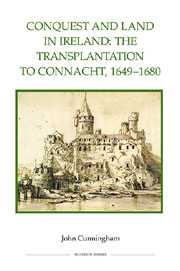Book contents
- Frontmatter
- Contents
- List of maps
- Acknowledgements
- Abbreviations
- Introduction
- 1 Conquest and land in Cromwellian Ireland, 1649–1652
- 2 Towards plantation and transportation, 1652–1654
- 3 The land settlement under threat, 1653–1655
- 4 Enforcing transplantation, 1655–1659
- 5 Transplantation in County Roscommon
- 6 The transplanters and the Restoration land settlement
- Conclusion
- Bibliography
- Index
6 - The transplanters and the Restoration land settlement
Published online by Cambridge University Press: 05 February 2013
- Frontmatter
- Contents
- List of maps
- Acknowledgements
- Abbreviations
- Introduction
- 1 Conquest and land in Cromwellian Ireland, 1649–1652
- 2 Towards plantation and transportation, 1652–1654
- 3 The land settlement under threat, 1653–1655
- 4 Enforcing transplantation, 1655–1659
- 5 Transplantation in County Roscommon
- 6 The transplanters and the Restoration land settlement
- Conclusion
- Bibliography
- Index
Summary
In the midst of the political uncertainty which marked the close of the 1650s, many Irish Catholics at home and abroad had reason to hope that they would soon be able to recover their confiscated estates. In December 1659 a gathering of gentlemen and officers in Brussels resolved to petition their exiled king for ‘security for their lives, estates, and equal liberty of subjects with England and Scotland; and a liberty of conscience in a modest and humble way’. In May 1660 another group of Irish Catholics sent an address from London to Ormond at Breda. Describing themselves as ‘the remnant of our miserable nation’, they expressed the hope that their presence in London would enable them to ‘reap with the first in this twilight of a coming settlement’. The general outlines of the complex land settlement which unfolded over the following two decades have been reconstructed by a number of historians. Among the more detailed works with a regional focus, Laurence Arnold's study of Co. Dublin is particularly illuminating. The main outcome is undisputed: in contrast to post-1660 developments in England and Scotland, the landownership changes recently wrought in Ireland would for the most part remain intact.
Within the broader context provided by existing scholarship, this chapter will seek to address the more specific question of how the restoration settlement impacted on the position of the transplanters.
- Type
- Chapter
- Information
- Conquest and Land in IrelandThe Transplantation to Connacht, 1649-1680, pp. 119 - 149Publisher: Boydell & BrewerPrint publication year: 2011



